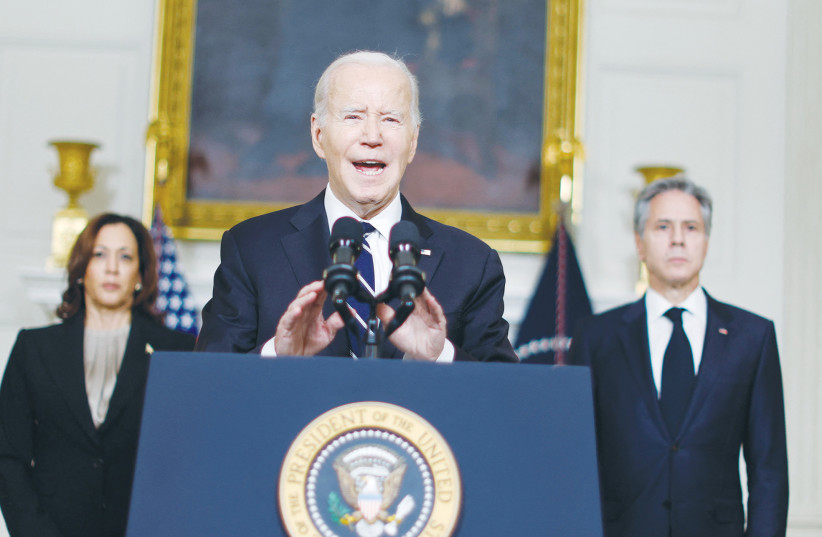The relationship between Israel and the US has always had its ebbs and tides throughout the Jewish state’s short lifetime.
Currently, we’re in one of the ebbs, amid a huge tide following the October 7 massacre by Hamas. President Joe Biden’s visit to Israel, as the country was in the raw throes of a huge trauma that it had never experienced, was an unforgettable rush of love – a giant hug from our strongest ally that reassured us that we were not alone.
The ebb arrived soon after, as Israel’s military campaign to remove the Hamas threat and the rescue of the hostages being held in Gaza, began to incur Gaza civilian casualties. Since then, even amid another great show of support when Iran launched its rocket salvo on Israel on April 13 and the US worked hand in hand with Jerusalem to fend off the attack, the US-Israel relationship has been fraught with tension.
Prime Minister Benjamin Netanyahu and Biden have often been at odds over the best way to secure Israel, as a deal to reach a ceasefire and a return of the hostages has repeatedly been stymied by Hamas.

But the iciness reached a new level last week when Netanyahu issued his now infamous video accusing the US of withholding vital munitions he said Israel needs to finish the job in Gaza.
PM Netanyahu doubles down on his decision
Speaking at the cabinet meeting on Sunday, Netanyahu defended his decision to make the dispute with the US public.
“Four months ago, there was a dramatic decrease in the munitions coming to Israel from the US. For long weeks, we turned to our American friends and requested that the shipments be expedited. We did this time and again. We did so at the highest levels, and at all levels, and I want to emphasize – we did so behind closed doors,” Netanyahu stated.
“We received all sorts of explanations, but one thing we did not receive; the basic situation did not change. Certain items arrived sporadically but the munitions at large remained behind. After months in which there was no change in this situation, I decided to give this public expression.”
Was Netanyahu’s decision to make the dispute public really a last-straw attempt to force the US to change its policy, or is there another reason that the prime minister would choose to pick a high-profile fight with Israel’s benefactor and ally?
We, like everyone else on the sidelines, don’t have the information and background to really know. The US may have changed its policy to send Netanyahu a not-so-subtle message that it won’t continue supporting the war that it sees as having no endgame or day-after plan, amid rising civilian deaths.
What we do know is that the current drama is unfolding as Netanyahu prepares to make a controversial visit to Washington on July 24 to address a joint session of Congress, a visit that the White House is certainly not pleased with.
Democratic Senate Majority Leader Chuck Schumer reluctantly signed on to the invitation, despite objecting to the way Netanyahu has conducted the war against Hamas.
“I have clear and profound disagreements with the prime minister, which I have voiced both privately and publicly and will continue to do so. But because America’s relationship with Israel is ironclad and transcends one person or prime minister, I joined the request for him to speak,” Schumer said.
It is impossible that Netanyahu doesn’t realize that his speech will further drive a wedge in America’s bipartisan support of Israel and antagonize a US administration that is already apparently exasperated with his policies surrounding the war in Gaza and also with the mounting likelihood of all-out war with Hezbollah in Lebanon.
Unless a very unlikely invitation to the White House for a meeting with Biden is forthcoming, now is the time, with a month to spare, for the prime minister to politely decline the invitation to address the joint houses and to concentrate on the issues at home.
The relationship between the US and Israel must be recalibrated like it has done so many times in the past. A divisive speech by an Israeli prime minister in Washington is not the way to do it.
